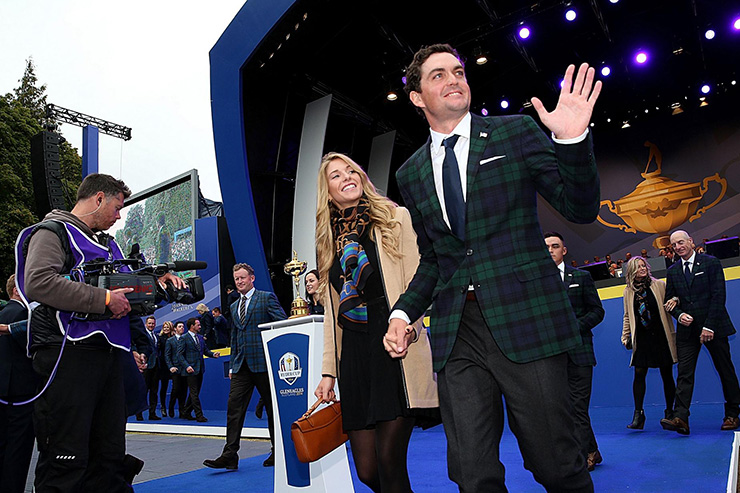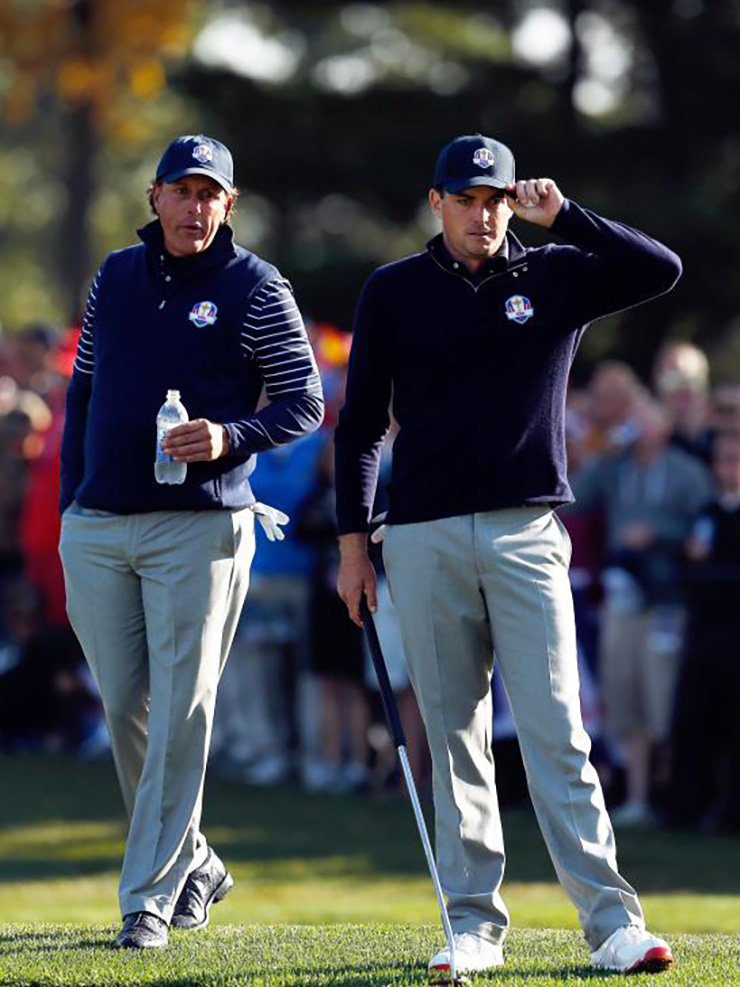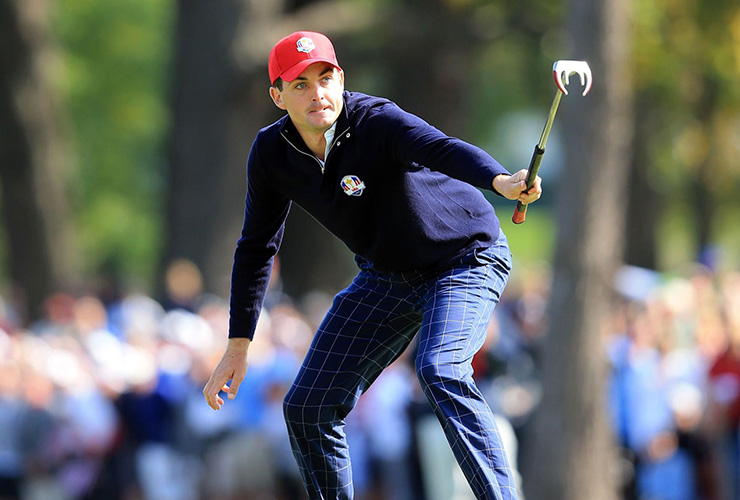After a delayed announcement, the PGA of America finally named its next U.S. Ryder Cup captain. And it’s a name no one expected.
Keegan Bradley, the 2011 PGA champion and two-time Ryder Cupper, is the pick to helm the American squad in 2025 when the matches come to New York’s Bethpage Black after months of negotiations between Tiger Woods and the PGA of America stalled. That Woods didn’t take the job is not necessarily a surprise; Woods acknowledged he was unsure he had the capacity to take on the job. But Stewart Cink and Fred Couples were the presumed fallbacks if Woods passed. Bradley? The last time he was mentioned around the American team was as a snub from last year’s playing roster.
So what do we make of the surprise announcement? Golf Digest writers Joel Beall (thumbs up) and Shane Ryan (thumbs down) give their opinions on Bradley’s captaincy.
Sense to be made in the shock of Bradley’s selection
The answer can be found in a suitcase that’s remained packed for some time.
Keegan Bradley famously said he would never allow himself to open his return luggage from the 2012 Ryder Cup. Not until, that is, he was part of a winning team. It was a story Bradley resurfaced last year when the six-time PGA Tour winner was desperately hoping to make his third U.S. Ryder Cup team (but first since 2014), only for his name not to be called when Zach Johnson announced his captain’s picks. The stigma that U.S. players don’t care about the Ryder Cup is overplayed and not entirely true. In the same breath, it’s clear that, as a group, they don’t carry the impalpable weight of hurt as their European comrades do. If the Americans win, great; if not, there’s a tournament to be played in the upcoming weeks. Bradley was the exception, unwilling to compromise his passion in spite of the pain it caused.
It’s exactly that passion that makes him the best choice to become the next U.S. Ryder Cup captain. Just not for the reasons you think.
The truth is, the Ryder Cup is arguably more of an exhibition than a sporting event, because in sporting events the issue is always in doubt. But golf’s biennial clash between the U.S. and Europe has become woefully predictable: the home side has won eight of the last nine matches and 11 of the last 13 Ryder Cups, with an average winning scoring margin of five points. There’s a decent chance a cardboard cutout of Rich Lerner could captain the U.S. to a win in Long Island next fall.
RELATED: Keegan Bradley named 2025 U.S. Ryder Cup captain after Tiger passes
Yet Bradley—or the idea of Bradley, or someone like him—was desperately needed. His attitude and love for the Ryder Cup runs perpendicular to the reported player unrest over money on the American side that surfaced at Marco Simone, to say nothing of the backdrop of greed that has been the undercurrent of golf’s civil war between the PGA Tour and LIV Golf. The Ryder Cup is arguably the one time the sport has true communal appeal, where fans come together to back their boys. In Bradley, the fans have an avatar for someone who cares about the Ryder Cup as much as they do.
Yes, the Americans are in need of care. There is no need to relitigate that the Europeans have refined a culture over decades centred around the Ryder Cup, with the family experience serving as the foundation for what they have built: to play for each other, to play for something other than themselves. It’s not the only reason why those who are considered rank-and-file tour pros most of the year turn into legends time and time again, or why they haven’t lost at home in 30 years, or why they continue to win as underdogs. That would imply the Europeans don’t care when they go on the road, where they have lost three of the past four times. It’s just the only reason that matters. Bradley could be the spark that lights an American fire that has the chance to burn long after his appointment.

Keegan Bradley is walking with his wife Jillian Stacey after the Opening Ceremony of the 2014 Ryder Cup at Gleneagles. Andrew Redington
It’s worth noting the work Bradley has ahead of him. In the wake of the embarrassing loss at the 2014 Ryder Cup, the U.S. task force was assembled to create a roadmap for the future that bred continuity. But more recently, the optics of a good ‘ole boys network have emerged, punctuated last year by Johnson using numerous captain’s picks on players he routinely rooms with on the road.
But it wasn’t just Johnson’s captaincy. The U.S. lost both of its away matches after the task force was assembled. Instead of using the Presidents Cup to groom future Ryder Cup players, the team went with veterans with little Ryder Cup upside. And grooming future American Ryder Cup captains has been inconsistent, too, with Davis Love III and Jim Furyk named President Cup captains instead of using the position to let new blood gain experience. Ideally, Bradley would get to oversee the Americans against the International team at Royal Montreal this September. At least by going with Bradley, the PGA of America is answering the criticism of a closed shop, bringing someone who was left out in the cold last year.
What that looks like remains unknown. Frankly, to call Bradley’s appointment good or bad doesn’t mean much right now. His captaincy will ultimately be defined with what transpires over three days at Bethpage Black, his picks and the environment he sets all retrofitted to a narrative appropriate with his team’s score. But one of the lasting memories of Rome was the dichotomy of Johnson’s message to his team, telling them to remember who they were, while Jon Rahm relayed that the Europeans success stemmed from “the ability to walk through those gates and those doors and forget about who you are outside of this week. What you have done or what you may do afterwards, really truly doesn’t matter.”
The latter mindset is the type of sentiment that makes the Ryder Cup special, no matter the outcome. That’s the mindset Bradley will bring, and he has the luggage to prove it.
Bradley is a bizarre answer to an impossible question
The Ryder Cup produces the biggest home-field advantage in all of sport, so it may not matter that the PGA of America just made the most bizarre, dumbfounding captain’s selection in the history of the event. In fact, if forced to pick this second, I’d put my money on the Americans winning at Bethpage Black in 2025. Hell, Keegan Bradley may even be a good captain. Why not? I certainly can’t predict that he won’t, because to do so would require some basis for judgment, and Bradley’s leadership résumé is utterly blank. It’s a fun hypothetical, like asking if he could run a gas station, or whistle a show tune, or eat a dozen eggs in a minute.
Ah yes, experience—the thing that humans have learned to value in literally every field of endeavor since time immemorial. I hate to dwell on the minor details, but in this sense, Bradley is somewhat lacking. The last time we saw him in association with the Ryder Cup, Zach Johnson was stifling a nervous giggle after he condemned Bradley to a weekend on the couch, where the snubbed pick could pretend not to delight in the schadenfreude of the Rome disaster. Before that, you have to go to 2014, when Bradley lost the clinching point to Jamie Donaldson in the woeful Gleneagles blowout. Before that, he put together a nice 3-0 record in the pairs session at Medinah with Phil Mickelson. All in all, his Ryder Cup record is solid is a decent 4-3.

Bradley thrived in his debut at the 2012 Ryder Cup when paired with Phil Mickelson. Jamie Squire/Getty Images
None of which is especially relevant to his ability to lead Team USA as a captain, but we’re talking about it now because when it comes to relevant experience, well … [this space missing].
What is going on here?
To understand why Bradley was picked, you first have to understand the chief failure of what has been a generally successful and innovative U.S. Ryder Cup task force. Since the group’s advent in the wake of the 2014 Gleneagles nightmare, it has struggled to prepare a younger generation for the captaincy. They tried with Zach Johnson, who (charitably) proved unable to meet the standard in Rome, but then the pipeline is dry after him. Look at his vice captains: Davis Love III, Jim Furyk, Steve Stricker, Fred Couples and Stewart Cink. That’s three former captains (one of whom, Love took the job twice, and then captained the Presidents Cup in 2022), one guy in Couples who is your classic fun uncle but will never be a captain, and Cink, the man who told me in 2021 that he thought his chance was gone. He was the fifth and final vice-captain, and he’s the only name whose exclusion vis-a-vis Bethpage raises an eyebrow.
In short, the task force ultimately was run like a board of directors, shuffling leadership between them. They got unlucky, too; Phil Mickelson and Tiger Woods were supposed to pick up the baton, but then Phil went to LIV and Tiger clearly turned down the job. (Which may not be the biggest tragedy; he wasn’t very good as Presidents Cup captain in Melbourne, nearly booting what looked like a sure thing before his players rescued him in Sunday singles.)
So, they faced the impossible question: Who do you make captain? Furyk, again? Stricker, again? Put a crown on Davis Love’s head and make him captain for life? That might look unseemly, and this great head-scratcher of a question produced the strangest possible decision: Bradley.
In one way, this looks like a pity pick—Keegan got the shaft last time, so let’s make it up to him. In a nastier way, it looks like a full-throated rebuke of Johnson’s captaincy. In every way, it’s confusing.
One of the great innovations of the modern captaincy was choosing someone just slightly older than the current players—someone in his late 40s or 50s who commanded some authority but who wasn’t yet out of touch with the younger generation. Bradley, at 38, pushes a good strategy to its absurd breaking point. He’s still playing. He is, by his own reckoning, an outsider. It would be wrong to say that other players didn’t respect him, or that he’s unpopular, but it is true that he’s fully out of the loop. As far as I can tell, he’s not an especially great communicator. How on earth is he going to summon the gravitas to lead his peers? (One thought, unbidden, keeps popping into my head: I wonder what Patrick Cantlay thinks of this guy?)
Also, I may have missed the announcement, but last I heard, he’s not retiring from competitive golf. Again, he’s 38. What if he makes the team? What if, like last time, he has a solid argument for making the team as a captain’s pick, and finds himself having to make a tough call … on himself? Worse, how is he going to have the time to take on the duties of the modern captaincy, which is essentially like being a two-year CEO of a major corporation, when he’s playing a full schedule?
This appears to be an act of desperation. In a quote from the press release, PGA of America president John Lindert cited three qualities he valued in Bradley: “Past Ryder Cup experience, strong relationships and unwavering passion for this event.” Bradley’s past Ryder Cup experience includes two Ryder Cups as a player, the lowest total of any U.S. Ryder Cup captain since Dave Stockton in 1991. “Strong relationships” with his fellow players has been refuted by Bradley himself in a Netflix documentary. And “unwavering passion” is nice, but also meaningless … or at least useless.
To be fair to the PGA of America, there is one way it has already succeeded marvellously, and that’s as a PR set piece. Scanning the reactions of the golf world, there are plenty who are lapping it up as an exciting, unpredictable story. Strange, sure, but very much outside the box and more than a little provocative. In that way, it’s reminiscent of nothing so much as Dec. 12, 2012, when Ted Bishop went on “The Today Show” to announce that Tom Watson would be the next U.S. captain in Gleneagles. And, well, we know how that worked out.
Main image: David Cannon/Getty Images









